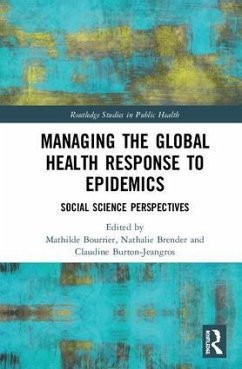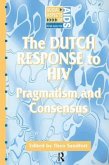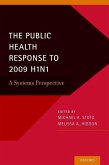Managing the Global Health Response to Epidemics
Social science perspectives
Herausgeber: Bourrier, Mathilde; Burton-Jeangros, Claudine; Brender, Nathalie
Managing the Global Health Response to Epidemics
Social science perspectives
Herausgeber: Bourrier, Mathilde; Burton-Jeangros, Claudine; Brender, Nathalie
- Gebundenes Buch
- Merkliste
- Auf die Merkliste
- Bewerten Bewerten
- Teilen
- Produkt teilen
- Produkterinnerung
- Produkterinnerung
Recent epidemics have prompted large-scale international interventions. During a crisis, however, global health actions - including planning and organizing, communicating about risk, and cost-benefit evaluations - aren't usually part of single, integrated global response.
Andere Kunden interessierten sich auch für
![The Dutch Response To HIV The Dutch Response To HIV]() Theo SandfortThe Dutch Response To HIV186,99 €
Theo SandfortThe Dutch Response To HIV186,99 €![The Republic of Korea's Coronavirus Disease Pandemic Response and Health System Preparedness The Republic of Korea's Coronavirus Disease Pandemic Response and Health System Preparedness]() Hoon Sang LeeThe Republic of Korea's Coronavirus Disease Pandemic Response and Health System Preparedness34,99 €
Hoon Sang LeeThe Republic of Korea's Coronavirus Disease Pandemic Response and Health System Preparedness34,99 €![The Dutch Response To HIV The Dutch Response To HIV]() Theo SandfortThe Dutch Response To HIV63,99 €
Theo SandfortThe Dutch Response To HIV63,99 €![Managing Global Health Projects in Low and Middle-Income Countries Managing Global Health Projects in Low and Middle-Income Countries]() Paul RobinsonManaging Global Health Projects in Low and Middle-Income Countries185,99 €
Paul RobinsonManaging Global Health Projects in Low and Middle-Income Countries185,99 €![Report On the Medical Topography and Epidemics of the State of New York: Submitted to the American Medical Association at Its Annual Meeting at New Ha Report On the Medical Topography and Epidemics of the State of New York: Submitted to the American Medical Association at Its Annual Meeting at New Ha]() Joseph Mather SmithReport On the Medical Topography and Epidemics of the State of New York: Submitted to the American Medical Association at Its Annual Meeting at New Ha30,99 €
Joseph Mather SmithReport On the Medical Topography and Epidemics of the State of New York: Submitted to the American Medical Association at Its Annual Meeting at New Ha30,99 €![What Has COVID-19 Taught Us About Asia's Health Emergency Preparedness and Response? What Has COVID-19 Taught Us About Asia's Health Emergency Preparedness and Response?]() Asian Development BankWhat Has COVID-19 Taught Us About Asia's Health Emergency Preparedness and Response?33,99 €
Asian Development BankWhat Has COVID-19 Taught Us About Asia's Health Emergency Preparedness and Response?33,99 €![Public Health Response to 2009 H1n1 Public Health Response to 2009 H1n1]() Michael A. StotoPublic Health Response to 2009 H1n179,99 €
Michael A. StotoPublic Health Response to 2009 H1n179,99 €-
-
-
Recent epidemics have prompted large-scale international interventions. During a crisis, however, global health actions - including planning and organizing, communicating about risk, and cost-benefit evaluations - aren't usually part of single, integrated global response.
Produktdetails
- Produktdetails
- Verlag: Routledge
- Seitenzahl: 306
- Erscheinungstermin: 21. Februar 2019
- Englisch
- Abmessung: 240mm x 161mm x 21mm
- Gewicht: 625g
- ISBN-13: 9781138578999
- ISBN-10: 1138578991
- Artikelnr.: 54879056
- Herstellerkennzeichnung
- Libri GmbH
- Europaallee 1
- 36244 Bad Hersfeld
- gpsr@libri.de
- Verlag: Routledge
- Seitenzahl: 306
- Erscheinungstermin: 21. Februar 2019
- Englisch
- Abmessung: 240mm x 161mm x 21mm
- Gewicht: 625g
- ISBN-13: 9781138578999
- ISBN-10: 1138578991
- Artikelnr.: 54879056
- Herstellerkennzeichnung
- Libri GmbH
- Europaallee 1
- 36244 Bad Hersfeld
- gpsr@libri.de
Mathilde Bourrier is Professor in the Department of Sociology, University of Geneva, Switzerland. Nathalie Brender is Associate Professor in the Geneva School of Business Administration, HES-SO University of Applied Sciences and Arts Western Switzerland. Claudine Burton-Jeangros is Professor in the Department of Sociology, University of Geneva, Switzerland.
Introduction
Mathilde Bourrier, Nathalie Brender and Claudine Burton-Jeangros
PART 1: Setting the Stage
1 The Challenges of Building Pandemic Response Systems Based on Unique
Cases: 2003 SARS, 2009 A(H1N1) and 2014 Ebola Epidemic
Ann Keller
2 The Future Strikes Back: Global Public Health Crises and the Rise of
Preparedness
Loïs Bastide
PART 2: Lessons Learned from the A(H1N1) Pandemic and 2014 Ebola Virus
Disease: a Multidisciplinary Point of View
3 Comparing the 2009 A(H1N1) Pandemic and 2014 Ebola Virus Disease: Of
Viruses, Surprises in Outbreak Responses and Global Health Work
Mathilde Bourrier
4 Epidemics and Risk Communication: Why are Lessons not Learned?
Claudine Burton- Jeangros
5 Emergency Capabilities: Deploying the WHO's Communication in West Africa
During the 2014 Ebola Epidemic
Loïs Bastide
6 The Use of Matrix Structure in Epidemic Management
Alexandrine Dupras
7 Shaping A(H1N1) Pandemic Response: Money will Follow
Nathalie Brender, David Maradan and Hélène Pasquini- Descomps
8 Financing the Crisis: Public Expenditure on the A(H1N1) Influenza
Pandemic in Switzerland, Japan and the United States
Hélène Pasquini- Descomps, Nathalie Brender and David Maradan
9 The Organizational Puzzle of the Global Health System: Insights from High
Reliability Organizations Theory
Mathilde Bourrier
PART 3: Complementing Views: Double Standard in Ethics and Care
10 Scarcity in the Midst of Abundance: The Case of the Medical Evacuation
of the Cuban Patient in Geneva, Switzerland
Aude Parfaite
11 Reaching Out to Ebola Victims: Coercion, Persuasion or an Appeal for
Self-sacrifice?
Philippe Calain and Marc Poncin
Conclusion: Global Health Revisited
Claudine Burton-Jeangros, Mathilde Bourrier and Nathalie Brender
Mathilde Bourrier, Nathalie Brender and Claudine Burton-Jeangros
PART 1: Setting the Stage
1 The Challenges of Building Pandemic Response Systems Based on Unique
Cases: 2003 SARS, 2009 A(H1N1) and 2014 Ebola Epidemic
Ann Keller
2 The Future Strikes Back: Global Public Health Crises and the Rise of
Preparedness
Loïs Bastide
PART 2: Lessons Learned from the A(H1N1) Pandemic and 2014 Ebola Virus
Disease: a Multidisciplinary Point of View
3 Comparing the 2009 A(H1N1) Pandemic and 2014 Ebola Virus Disease: Of
Viruses, Surprises in Outbreak Responses and Global Health Work
Mathilde Bourrier
4 Epidemics and Risk Communication: Why are Lessons not Learned?
Claudine Burton- Jeangros
5 Emergency Capabilities: Deploying the WHO's Communication in West Africa
During the 2014 Ebola Epidemic
Loïs Bastide
6 The Use of Matrix Structure in Epidemic Management
Alexandrine Dupras
7 Shaping A(H1N1) Pandemic Response: Money will Follow
Nathalie Brender, David Maradan and Hélène Pasquini- Descomps
8 Financing the Crisis: Public Expenditure on the A(H1N1) Influenza
Pandemic in Switzerland, Japan and the United States
Hélène Pasquini- Descomps, Nathalie Brender and David Maradan
9 The Organizational Puzzle of the Global Health System: Insights from High
Reliability Organizations Theory
Mathilde Bourrier
PART 3: Complementing Views: Double Standard in Ethics and Care
10 Scarcity in the Midst of Abundance: The Case of the Medical Evacuation
of the Cuban Patient in Geneva, Switzerland
Aude Parfaite
11 Reaching Out to Ebola Victims: Coercion, Persuasion or an Appeal for
Self-sacrifice?
Philippe Calain and Marc Poncin
Conclusion: Global Health Revisited
Claudine Burton-Jeangros, Mathilde Bourrier and Nathalie Brender
Introduction
Mathilde Bourrier, Nathalie Brender and Claudine Burton-Jeangros
PART 1: Setting the Stage
1 The Challenges of Building Pandemic Response Systems Based on Unique
Cases: 2003 SARS, 2009 A(H1N1) and 2014 Ebola Epidemic
Ann Keller
2 The Future Strikes Back: Global Public Health Crises and the Rise of
Preparedness
Loïs Bastide
PART 2: Lessons Learned from the A(H1N1) Pandemic and 2014 Ebola Virus
Disease: a Multidisciplinary Point of View
3 Comparing the 2009 A(H1N1) Pandemic and 2014 Ebola Virus Disease: Of
Viruses, Surprises in Outbreak Responses and Global Health Work
Mathilde Bourrier
4 Epidemics and Risk Communication: Why are Lessons not Learned?
Claudine Burton- Jeangros
5 Emergency Capabilities: Deploying the WHO's Communication in West Africa
During the 2014 Ebola Epidemic
Loïs Bastide
6 The Use of Matrix Structure in Epidemic Management
Alexandrine Dupras
7 Shaping A(H1N1) Pandemic Response: Money will Follow
Nathalie Brender, David Maradan and Hélène Pasquini- Descomps
8 Financing the Crisis: Public Expenditure on the A(H1N1) Influenza
Pandemic in Switzerland, Japan and the United States
Hélène Pasquini- Descomps, Nathalie Brender and David Maradan
9 The Organizational Puzzle of the Global Health System: Insights from High
Reliability Organizations Theory
Mathilde Bourrier
PART 3: Complementing Views: Double Standard in Ethics and Care
10 Scarcity in the Midst of Abundance: The Case of the Medical Evacuation
of the Cuban Patient in Geneva, Switzerland
Aude Parfaite
11 Reaching Out to Ebola Victims: Coercion, Persuasion or an Appeal for
Self-sacrifice?
Philippe Calain and Marc Poncin
Conclusion: Global Health Revisited
Claudine Burton-Jeangros, Mathilde Bourrier and Nathalie Brender
Mathilde Bourrier, Nathalie Brender and Claudine Burton-Jeangros
PART 1: Setting the Stage
1 The Challenges of Building Pandemic Response Systems Based on Unique
Cases: 2003 SARS, 2009 A(H1N1) and 2014 Ebola Epidemic
Ann Keller
2 The Future Strikes Back: Global Public Health Crises and the Rise of
Preparedness
Loïs Bastide
PART 2: Lessons Learned from the A(H1N1) Pandemic and 2014 Ebola Virus
Disease: a Multidisciplinary Point of View
3 Comparing the 2009 A(H1N1) Pandemic and 2014 Ebola Virus Disease: Of
Viruses, Surprises in Outbreak Responses and Global Health Work
Mathilde Bourrier
4 Epidemics and Risk Communication: Why are Lessons not Learned?
Claudine Burton- Jeangros
5 Emergency Capabilities: Deploying the WHO's Communication in West Africa
During the 2014 Ebola Epidemic
Loïs Bastide
6 The Use of Matrix Structure in Epidemic Management
Alexandrine Dupras
7 Shaping A(H1N1) Pandemic Response: Money will Follow
Nathalie Brender, David Maradan and Hélène Pasquini- Descomps
8 Financing the Crisis: Public Expenditure on the A(H1N1) Influenza
Pandemic in Switzerland, Japan and the United States
Hélène Pasquini- Descomps, Nathalie Brender and David Maradan
9 The Organizational Puzzle of the Global Health System: Insights from High
Reliability Organizations Theory
Mathilde Bourrier
PART 3: Complementing Views: Double Standard in Ethics and Care
10 Scarcity in the Midst of Abundance: The Case of the Medical Evacuation
of the Cuban Patient in Geneva, Switzerland
Aude Parfaite
11 Reaching Out to Ebola Victims: Coercion, Persuasion or an Appeal for
Self-sacrifice?
Philippe Calain and Marc Poncin
Conclusion: Global Health Revisited
Claudine Burton-Jeangros, Mathilde Bourrier and Nathalie Brender








